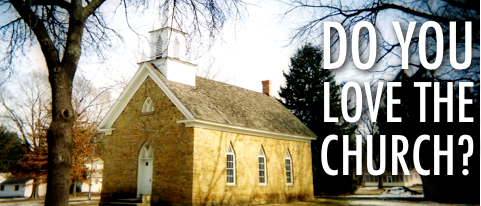Let’s go ahead and say it. There are a lot of problems with the church. A recent rash of books has pointed out the sad fact: people are leaving the church in droves. And it’s not just disaffected teens. It’s everyone. The church seems to have more than its fair share of problems, foibles, shortcomings, and embarrassments. In spite of it all, we need to love the church.
Why You Should Love Your Church?
It’s a whole lot easier to dislike the church than it is to love her. I mean, just see how many problems are in the church! As one author wrote, “It’s hip to beat up on the church.” Maybe so. But it’s also dangerous.
You should love the church instead.
-
- Loving the church is part of what it means to be a Christian. What’s the mark of a true Christian? He loves other Christians. The community of other Christians is the church. Christians should love the church. See John 13:35.
- Loving the church is to be on the mission. We as Christians are on the mission to reach others with the gospel of Jesus. We want to engage people, and share Christ so that they, too, can be part of the church. But if the church is a loveless place, why would any unbeliever want to be there? Why would you even want to bring them?
- Jesus loves the church. Listen to this: “Christ loved the church and gave himself up for her, so that he might sanctify her, having cleansed her by the washing of water with the word, so that he might present the church to himself in splendor, without spot or wrinkle or any such thing, that she might be holy and without blemish” (Ephesians 5:25-27). Wow. That’s the kind of love that Jesus has for the church.
- God uses the church. The church is a living community of messengers. God uses the church to proclaim in ways that you wouldn’t believe. Like this: “Through the church the manifold wisdom of God might be made known to the rulers and authorities in the heavenly places.” God is using the church to show His wisdom to heavenly rulers. That’s incredible. God is confident in the church, because He redeemed it. We should love it.
- The church isn’t as bad as you think. When we see problems in the church, we often fail to see the positives. Take this, for example: “To the church of God that is in Corinth, to those sanctified in Christ Jesus, called to be saints together” (1 Corinthians 1:2). Hold on a sec. Paul wrote that in a letter to a church in Corinth, quite possibly the worst church of the first millennium. It as bad there, and yet Paul could say: you are saints. Yes, he saw the problems. (And believe me, he addressed them.) But he also saw the fact that Christians are sanctified. Christ’s sacrificial death and glorious resurrection defeated sin, spite, and hate, transforming dirty desperate people into saints. Seeing the church as a redeemed and sanctified body of believers helps us look past the bad, and into the absolute goodness of what Jesus has done.
- Loving the church is the only way to change the church. We all realize that the church can be an unpleasant place at times. Disliking the church plunges you into the problem. Loving the church, however, allows you to help change the problem. When you see the meanness, counteract it with love. When you see the apathy, reverse it with excitement. When you see the spiteful, respond with grace. Love the church, and you’ll help change the church.
When you hate on the church, you are hating on real people—God’s people. When you criticize, malign, vilify, and criticize the church, rather than loving her, you are attacking Christ’s bride. We would do well to look up for a moment and focus on the church’s beauty. There is much to behold, and it will change the way you look at the church.
You can start loving the church.
You should.

